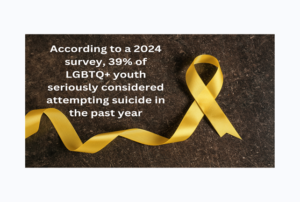As a member of the LGBTQ community, you face unique challenges that can impact your mental health and increase your risk of substance abuse. Alarmingly, LGBTQ individuals are more than twice as likely to experience suicidal thoughts compared to the general population. At Society Wellness, we understand these struggles and offer comprehensive care tailored to your needs. Our specialized LGBTQ rehab center provides various levels of treatment for addictions to heroin, methamphetamine, alcohol, opiates, and other substances, including chemsex. We also address co-occurring mental health disorders such as anxiety, depression, and psychosis. This Suicide Prevention Month, we invite you to explore our compassionate, evidence-based approach to healing and recovery. Reach out today at (888) 410-4757 to take the first step toward recovery.
Suicide Rates in the LGBTQ Community
Alarming Statistics
Tragically, LGBTQ individuals face staggeringly high rates of suicidality. A shocking 40% of transgender adults report having attempted suicide, with 92% of those attempts occurring before age 25. Lesbian, gay, and questioning youth are four times more likely to attempt suicide compared to heterosexual peers.
Compounding Factors
These harrowing statistics stem from a multitude of factors, including discrimination, rejection, bullying, homelessness, addiction, and violence – creating immense minority stress. This hostile environment can trigger depression, substance abuse as a coping mechanism, and feelings of being unworthy – all of which elevate suicide risk.
Disparities Within the Community
Suicide risk varies considerably within LGBTQ subgroups based on intersections with other identities like gender, age, and race/ethnicity. Bisexual women, those with lower education/income, and HIV-positive individuals face heightened risks. Transgender individuals are 2.5 times more likely to abuse drugs like cocaine and meth compared to the general population.

Suicide Warning Signs and Risk Factors
Recognize the Warning Signs
Be alert for these potential warning signs someone may be at risk for suicide: expressing hopelessness, feeling trapped, suicidal thoughts, severe mood swings, withdrawing from loved ones, increased substance abuse, or giving away possessions. According to a 2024 survey, 39% of LGBTQ+ youth seriously considered attempting suicide in the past year.
Risk Factors to Be Aware Of
Mental health issues like depression, past trauma or abuse, impulsive behavior, and previous suicide attempts increase suicide risk. Environmental stressors such as relationship breakups, financial insecurity, homelessness, and lack of community support also heighten the danger. Factors that reduce risk include strong family connections, safe school environments, and access to LGBTQ-affirming mental health care.
Supportive Action is Crucial
Discrimination and rejection faced by LGBTQ youth – not their identity itself – is a key driver behind their higher rates of suicidal thoughts and attempts. Supportive adults, access to resources like The Trevor Project’s crisis services, and inclusive communities can be life-saving protective factors. Transgender individuals face an especially high risk, with a 2019 study from the Trevor Project showing that 40% of transgender adults report attempting suicide at some point in their lives. This is nearly nine times the rate of the general U.S. population.
Addiction Treatment Programs for the LGBTQ Community
Specialized Support
The LGBTQ+ community faces higher rates of substance abuse, mental health challenges, and co-occurring disorders due to factors like discrimination, trauma, and minority stress. To address these unique needs, specialized addiction treatment programs tailored for LGBTQ+ individuals are available.
Affirming Environments
These programs create safe, affirming spaces through LGBTQ-inclusive policies, gender-neutral facilities, and culturally competent staff trained in LGBTQ+ issues. Clients can access care without judgment, fostering a sense of belonging and resilience.
Comprehensive Care
LGBTQ-focused treatment centers offer varying levels of care, from residential and evening outpatient programs to telehealth services. They treat substance use disorders involving alcohol, opioids, methamphetamines, and more, alongside co-occurring mental health conditions like depression, anxiety, trauma, and psychosis. Greater Boston Addiction Centers also offer extensive addiction treatment programs.
Mental Health Disorders Society Wellness Treats
Concurrent Treatment Approach
Society Wellness provides specialized addiction treatment alongside mental health services for the LGBTQ community. Their integrative approach recognizes the higher risk of substance misuse and co-occurring disorders faced by this population. Clinicians are dually licensed in addiction and mental health, offering individualized treatment plans in a safe, supportive environment.
Comprehensive Care
Society Wellness treats a range of mental health conditions alongside addiction. This includes psychosis, anxiety, depression, and trauma-related disorders stemming from experiences like internalized homophobia or discrimination. Their culturally competent clinicians provide LGBTQ-affirming care, creating an environment conducive to holistic healing.
Proven Approaches
Evidence-based therapies like CBT and DBT are combined with holistic practices for a well-rounded treatment experience. Specialized programs utilize person-centered care, peer support, and family involvement when appropriate – all tailored to the unique needs of LGBTQ individuals in recovery.
FAQ on Suicide Prevention and Addiction Treatment
Risk Factors & Statistics
- LGBTQ individuals experience higher rates of substance use disorders and mental health issues like depression and anxiety. Around 39% of LGBTQ adults struggle with substance misuse, compared to 16% of the general population.
Effective Treatments
- Evidence-based treatments include behavioral therapies like contingency management, cognitive-behavioral therapy, and the Matrix Model. Pharmacological interventions like bupropion and modafinil may also be used off-label.
- Integrated care addressing co-occurring mental health conditions like depression, psychosis, and anxiety is crucial for successful recovery.
Conclusion
As you’ve learned, the LGBTQ community faces disproportionately high suicide rates and addiction challenges. With suicide rates 4 times higher than the general population, it’s crucial to seek help. Society Wellness offers comprehensive care tailored to LGBTQ individuals, addressing addiction to alcohol and drugs. Their multi-level care approach also treats co-occurring mental health disorders such as psychosis, anxiety, and depression. By providing specialized support, Society Wellness aims to reduce these alarming statistics and improve overall well-being within the LGBTQ community. Remember, seeking help is a sign of strength, not weakness. Your journey to recovery and mental health starts with reaching out. This September, reach out today at (888) 410-4757 to take the first step toward recovery.
